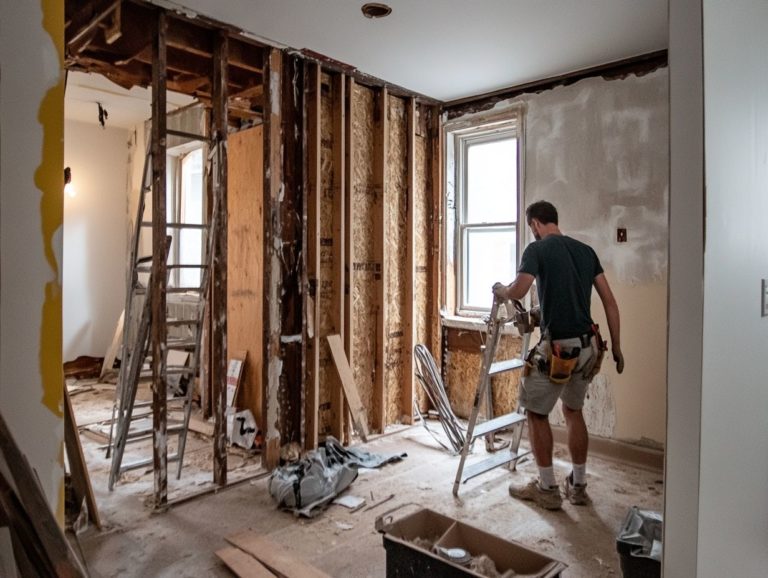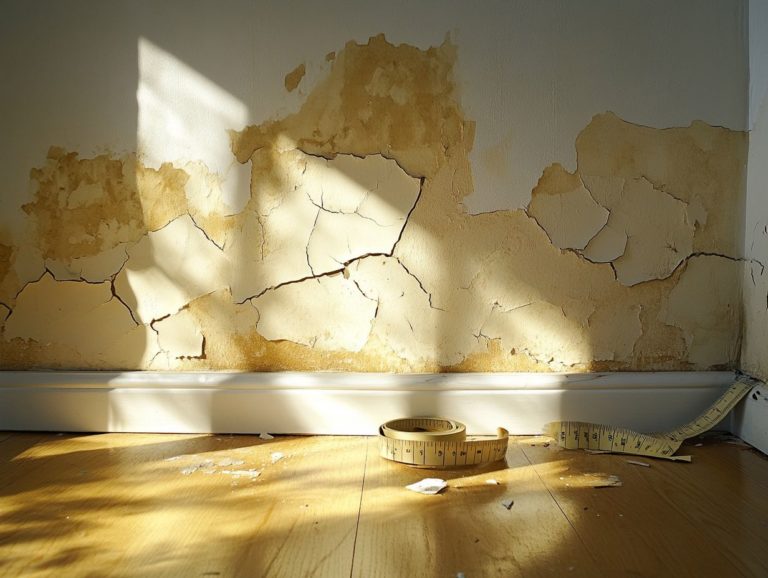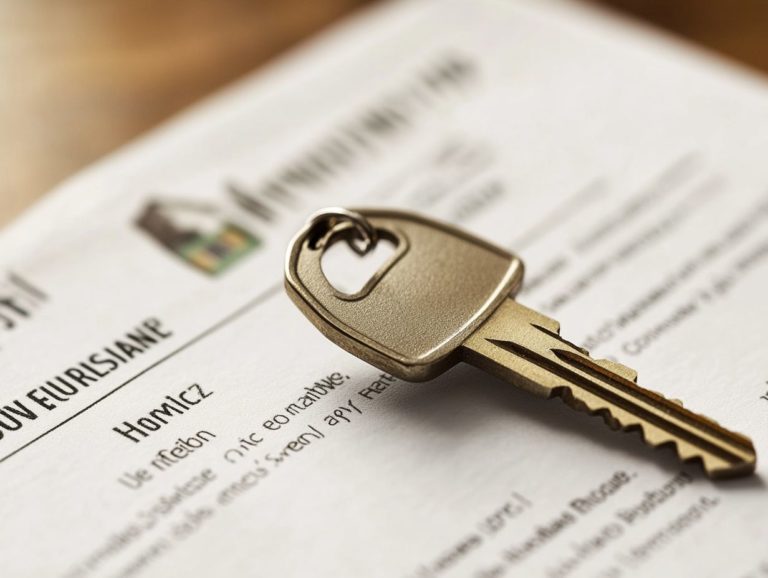What is Actual Cash Value vs Replacement Cost?
Understanding the nuances of Actual Cash Value (ACV) and Replacement Cost is essential for anyone navigating insurance policies. These terms significantly impact how much you ll receive in the event of a claim, and they differ considerably in their calculations and implications.
This article delves into the definitions, methods of calculation, and the importance of grasping these distinctions. You’ll weigh the pros and cons of each approach while discovering tips for maximizing your coverage.
Whether you re a homeowner, renter, or business owner, understanding these concepts empowers you to make informed decisions about your insurance needs.
Contents
- Key Takeaways:
- Understanding Actual Cash Value and Replacement Cost
- How Actual Cash Value and Replacement Cost are Calculated
- The Importance of Knowing the Difference
- Pros and Cons of Actual Cash Value and Replacement Cost
- When to Choose Actual Cash Value or Replacement Cost
- Tips for Maximizing Your Coverage
- Frequently Asked Questions
- What is Actual Cash Value vs Replacement Cost?
- How is Actual Cash Value calculated?
- How is Replacement Cost determined?
- Which method is better for insurance purposes?
- Does my insurance policy cover Actual Cash Value or Replacement Cost?
- Are there any factors that can affect the value of Actual Cash Value or Replacement Cost?
Key Takeaways:
- Actual Cash Value and Replacement Cost are two different methods for determining the value of property, with Replacement Cost covering the full cost of replacement and Actual Cash Value deducting for depreciation.
- The calculation of Actual Cash Value and Replacement Cost includes various factors, such as the age and condition of the property, and can vary depending on the insurance company.
- Understanding the difference between Actual Cash Value and Replacement Cost is crucial for ensuring proper insurance coverage, as it can significantly impact reimbursement in the event of damage or loss.
Understanding Actual Cash Value and Replacement Cost
Are you ready to enhance your insurance coverage? Knowing the distinctions between Actual Cash Value and Replacement Cost is essential for making informed decisions as a homeowner.
Actual Cash Value represents the depreciated worth of your property or items at the time of loss, while Replacement Cost refers to the amount necessary to replace a lost or damaged item with a brand-new equivalent of similar kind and quality.
Familiarizing yourself with these definitions can profoundly influence the claims process and the financial payout you receive during a loss.
Definitions and Differences
Actual Cash Value and Replacement Cost are vital concepts in insurance that decide how you get paid for your losses.
Understanding these terms is crucial for homeowners and property owners, as they directly impact the financial protection you may receive after a loss. Actual Cash Value reflects the current worth of an item, factoring in depreciation. For example, if a roof that originally cost $10,000 gets damaged, its Actual Cash Value might only be around $5,000, considering its age.
Replacement Cost, however, provides you with the necessary funds to replace the damaged property at current market prices, without taking depreciation into account. If that same roof needs replacing, you could receive the full $10,000 to install a brand-new one.
By understanding these distinctions, you can evaluate your insurance policies more effectively, ensuring that you have adequate coverage tailored to your specific needs.
How Actual Cash Value and Replacement Cost are Calculated
The calculation of Actual Cash Value and Replacement Cost involves a range of methodologies that consider various factors influencing the insured items.
When determining Actual Cash Value, insurers typically deduct depreciation from the item’s original cost. Replacement Cost assessments focus on the current market price of comparable items.
Understanding these calculations can empower homeowners to act quickly during claims and make informed decisions regarding the types of coverage included in their home insurance policy.
Factors and Methods Used
In the world of insurance, several factors and methods come into play when determining how Actual Cash Value and Replacement Cost are calculated. This complexity arises from the necessity to consider variables such as the age and condition of the property you have insured, as these elements can significantly affect value assessments. To better understand the differences, it’s helpful to explore replacement cost vs actual cash value.
Insurance companies analyze market trends meticulously, leveraging data to assess the worth of similar assets in today s marketplace. The materials used in construction also play a crucial role in determining replacement costs; premium materials can elevate overall value considerably.
To ensure a detailed and precise calculation that accurately reflects your property’s true worth, various methodologies are employed, including comparative market analysis and replacement cost estimators.
Ready to review your insurance policies? Understanding these key concepts can help you maximize your coverage and ensure you re adequately protected.
The Importance of Knowing the Difference
Grasping the distinction between actual cash value and replacement cost is essential for homeowners eager to choose the most suitable insurance coverage. This choice can greatly affect the financial landscape when a claim arises.
Understanding the nuances enables you to safeguard your possessions and property with confidence. Making an informed decision not only enhances your financial planning but also sharpens your risk management strategy, giving you the power to navigate potential pitfalls with ease.
Implications for Insurance Coverage
The implications for your insurance coverage hinge significantly on whether you opt for actual cash value or replacement cost for your home insurance policy. This decision plays a crucial role in shaping your premiums and coverage limits.
It also determines the level of financial protection available when it s time to file a claim. For example, if you choose an actual cash value policy, depreciation comes into play. Depreciation means the reduction in value over time.
This means that if you experience a loss, the payout might not fully cover the cost to replace your damaged property. On the other hand, selecting replacement cost coverage often results in higher premiums, but it offers peace of mind that you ll be reimbursed for the full amount needed to replace lost items, regardless of their current condition.
Imagine facing a storm and your roof gets damaged. With actual cash value coverage, you might receive just enough to cover a fraction of the replacement cost. But with replacement cost insurance, you can restore your roof to its original glory without the stress of extra out-of-pocket expenses!
Pros and Cons of Actual Cash Value and Replacement Cost
When assessing actual cash value versus replacement cost in home insurance, it s crucial to weigh the advantages and disadvantages of each choice. Actual cash value policies generally come with lower premiums.
However, they might fall short in covering the complete cost of replacing lost or damaged items, particularly if those items have depreciated considerably. Replacement cost policies offer a more robust safety net, though they often come with higher premiums and deductibles.
This makes it essential for you to think carefully about your finances before making a decision.
Advantages and Disadvantages
Each option actual cash value and replacement cost offers distinct advantages and disadvantages that you should consider. Understanding these differences is essential for making informed decisions about your insurance coverage.
Actual cash value often leads to lower premiums, making it an attractive choice for budget-conscious homeowners. However, you might find that it provides insufficient funds in the event of a loss, as it deducts depreciation from the payout.
Replacement cost coverage offers a higher payout amount that reflects current market prices, allowing you to replace damaged belongings without feeling the financial pinch. This option generally comes with higher premiums, which could be a crucial factor if you’re working within a tight budget.
Ultimately, the right choice depends on your household’s financial situation and the value of your assets.
When to Choose Actual Cash Value or Replacement Cost
When contemplating whether to choose actual cash value or replacement cost for your insurance policy, it’s essential to consider several key factors that can significantly impact your financial well-being.
Consider the age of your belongings, the potential for depreciation, and your overall coverage requirements, ensuring they align with the options available to you.
Engaging with a financial advisor can offer invaluable insights, helping you determine which choice best aligns with your unique financial objectives and property protection needs. Don’t leave your financial future to chance!
Factors to Consider
When choosing between actual cash value and replacement cost for insurance, consider a few key factors.
The age of your items is crucial. Older possessions, like a vintage television or a well-worn roof, typically lose value over time. This makes actual cash value an appealing option for you.
If you re dealing with recent purchases like a brand-new laptop or upgraded appliances replacement cost coverage becomes more advantageous. It allows you to replace those items without facing hefty out-of-pocket expenses.
Your personal financial situation also heavily influences this decision. If you find yourself navigating tight budget constraints, you might lean toward the lower premiums that actual cash value offers.
If you’re in a better financial position to handle unexpected costs, opting for replacement coverage could provide you with valuable peace of mind.
Tips for Maximizing Your Coverage
Maximizing your insurance coverage demands a proactive mindset. This involves a thorough understanding of your policy options and decisive actions to safeguard your financial well-being.
Homeowners should regularly check their inventory to ensure that they have the right coverage tailored to their unique needs. It s also important to examine the specifics of their policy features and seek guidance from a financial advisor.
By remaining informed and prepared, you can effectively minimize potential losses and navigate the claims process with ease when the situation arises.
Strategies for Getting the Most Out of Your Policy
Implementing effective strategies can significantly enhance your experience with your insurance policy, ensuring you derive the maximum benefit from your coverage.
As a homeowner, you should regularly update your inventory of possessions. This helps guarantee that all valuable items are accounted for and accurately represented in your policy.
Familiarizing yourself with the claims process is equally important. This knowledge can help you navigate potential hurdles more smoothly when the need arises. Knowing what documentation is required can expedite your claims.
Choosing appropriate deductibles is also crucial. A deductible is the amount you pay out of pocket before your insurance kicks in. While opting for a higher deductible might lower your monthly premiums, it’s vital to ensure that it remains affordable should you need to file a claim.
By incorporating these best practices, you can create a more robust financial safety net for yourself.
Frequently Asked Questions
What is Actual Cash Value vs Replacement Cost?
Actual Cash Value (ACV) and Replacement Cost are two methods used to determine the value of property for insurance purposes. ACV is the current value of the property, considering depreciation, while Replacement Cost is the amount it would cost to replace the property with a similar new item.
How is Actual Cash Value calculated?
Actual Cash Value is calculated by taking the original cost of the property and subtracting depreciation based on its age, condition, and expected lifespan. This results in a lower value than the original cost, as it takes into account wear and tear.
How is Replacement Cost determined?
Replacement Cost is determined by obtaining estimates for the cost of replacing the property with a similar new item. This method does not take into account depreciation, resulting in a higher value than Actual Cash Value.
Which method is better for insurance purposes?
It depends on the type of coverage you want for your property. Actual Cash Value is typically less expensive, but it may not cover the full cost of replacing your property if it is damaged or destroyed. Replacement Cost may result in higher premiums, but it provides more comprehensive coverage.
Does my insurance policy cover Actual Cash Value or Replacement Cost?
This depends on your specific insurance policy. It is important to review your policy and speak with your insurance agent to determine which method is used and what is covered in the event of a loss.
Are there any factors that can affect the value of Actual Cash Value or Replacement Cost?
Yes, several factors can affect the value of both Actual Cash Value and Replacement Cost. These include inflation, market value fluctuations, and the type and amount of coverage included in your policy. It is important to regularly review and update your insurance policy to ensure you have adequate coverage for your property.






